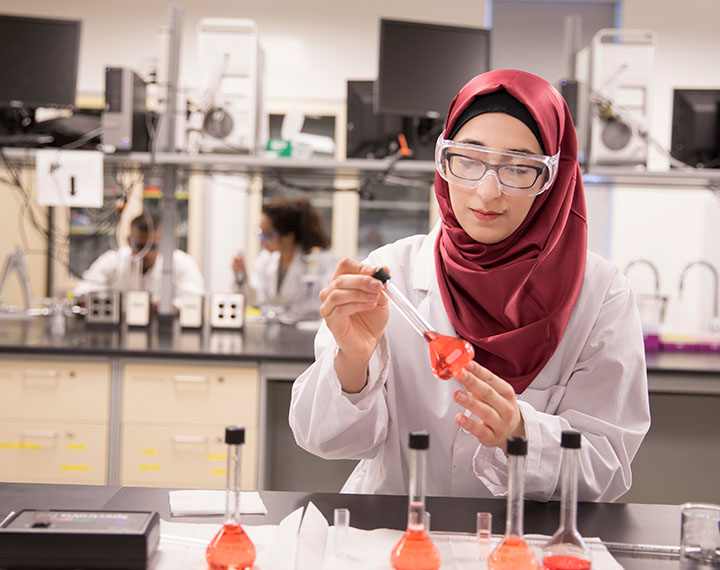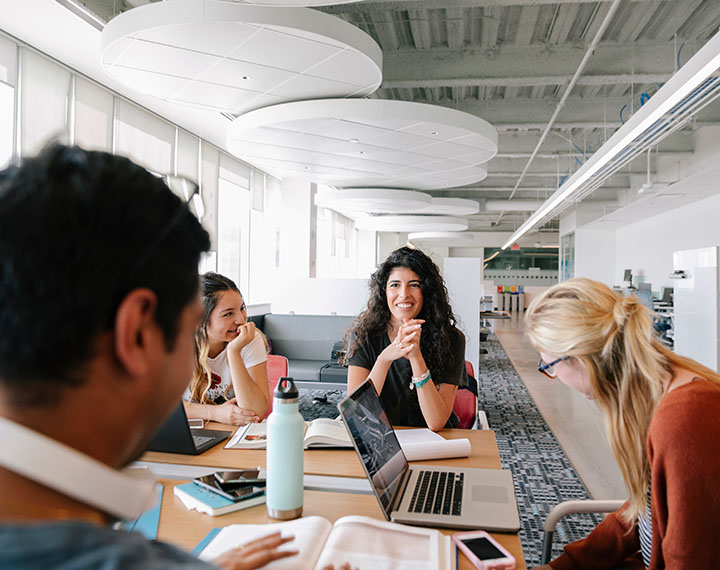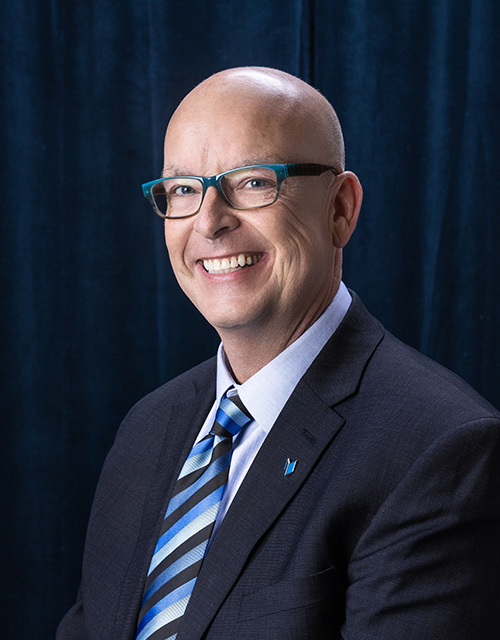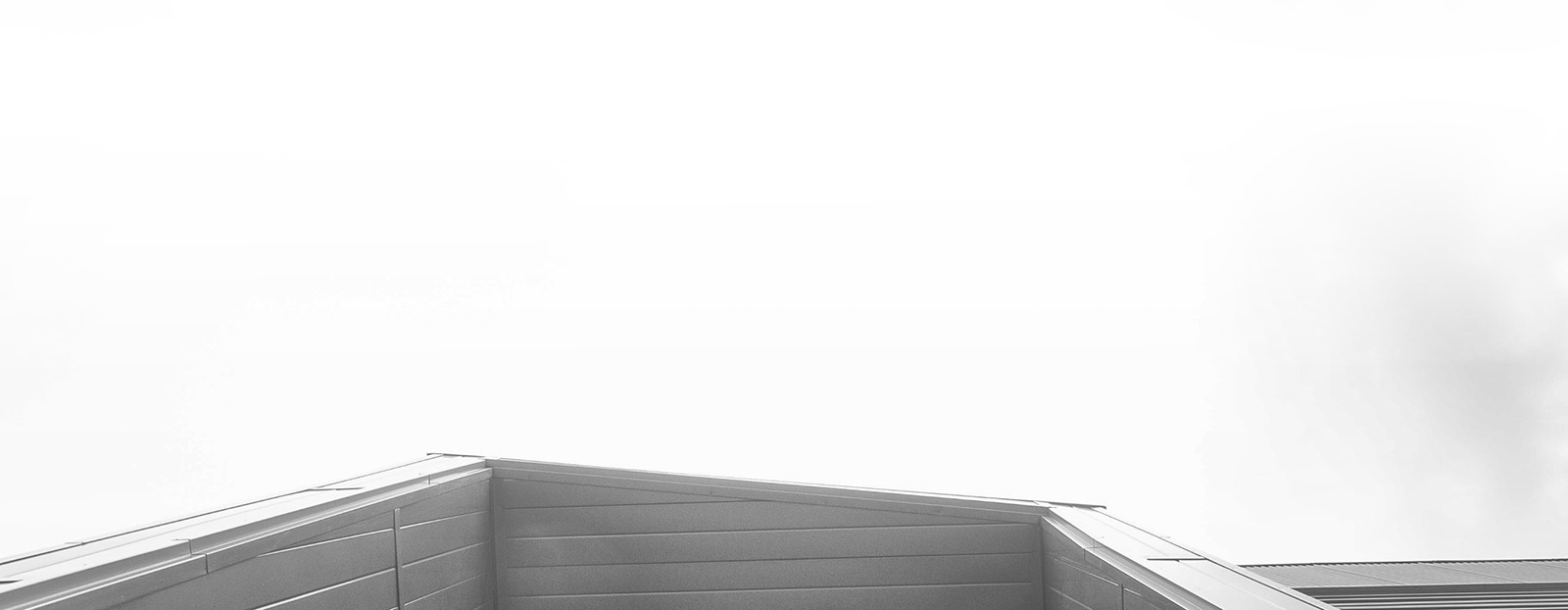Planning for the future of MRU
For more than 110 years Mount Royal has been dedicated to exceptional undergraduate learning in the city of Calgary and beyond. We’re excited for our future and want you to be part of it too.
Vision 2030: Opening Minds and Changing Lives
Vision 2030: Opening Minds and Changing Lives sets our strategic direction for the future and is the foundation for all planning at the University. We will realize our vision through the institutional planning framework, which maps critical relationships from Vision 2030 to other key institutional plans. Vision 2030 sets the overall direction, and our divisional plans and planning activities will advance MRU’s priorities by taking action to achieve each goal.
Vision 2030: MRU Strategic Plan Our plan in actionOur institutional plans
Vision 2030 will be successfully implemented by the incorporation of all of our faculty, division and department plans. Together, we will open minds and change lives.
Academic Plan
Research and Scholarship Plan
Students Plan
Under development
- Equity, Diversity and Inclusion Plan
University Strategic Plan 2023 – 2030
Opening Minds and Changing Lives is a strategic roadmap designed to guide Mount Royal University's growth, adaptability to societal shifts and attainment of key goals. Formulated through community collaboration and approved by the Board of Governors in 2023, it builds upon five key directions to establish ten pivotal goals. By realizing this plan, we position Mount Royal as the university of choice for learners, current and future employees, and our local and global communities.
Read the full planI firmly believe that the path outlined in this plan will allow employees to thrive in a fulfilling work environment and offer students a rewarding and rigorous educational experience.
Tim Rahilly, PhD,
President and Vice-Chancellor
Vision
Opening Minds and Changing Lives
Opening Minds and Changing Lives reflects our dedication to providing students with a holistic and transformative education, preparing them to become lifelong learners and active global citizens.
Through their academic experiences and as members of a diverse, inclusive and supportive community, students will be equipped with the knowledge and skills they need to develop to their full potential.

Mission
To provide meaningful and engaged learning opportunities that create individual transformation and societal benefit.
We recognize that every learner who comes to Mount Royal has their own aspirations for pursuing a university education. Knowing their reasons for attending university are as unique as they are, we strive to provide all students with enriching learning opportunities that help them discover and cultivate the knowledge and skills they need to succeed and make a lasting impact on today’s changing world.

Values
Mount Royal University recognizes the importance of creating a culture where community members share deeply held values. Our shared values will guide our decisions and actions as we work to fulfill our mission and vision.
- Transformation
- Belonging
- Boldness
- Inquisitiveness
- Authenticity
Transformation
- We are positive and future-focused with the energy to create and lead
- We face changes in the world with courage, connection and capability
- We provide an educational experience that prepares students to succeed and have an impact in an evolving world
Belonging
- We celebrate the diversity of people, culture and ideas by fostering a safe and inclusive campus
- We meet students where they are, providing an education and experience accessible to all
- We support people to become who they want to be, through academic and personal growth
- We are rooted in the Calgary community and we welcome the world to experience MRU
Boldness
- We are risk-takers and changemakers: courageous, collaborative and confident
- We are ambitious and comfortable challenging traditional expectations
- We offer a space to enable people to become who they want to be, on their journey of self‑discovery
- We view challenges as opportunities to adapt through new ways of thinking and doing
Inquisitiveness
- We appreciate knowledge is limitless and continually seek to learn
- We recognize critical thought is the basis of education and encourage new perspectives
- We value dialogue and inquiry rooted in free expression, together with civility, mutual respect and empathy
- We pursue scholarly inquiry through research and innovation to inform teaching and contribute to the advancement of knowledge and practice
- We help students understand the world so they may apply their knowledge for societal good
Authenticity
- We know who we are and seek to change and grow in a uniquely MRU way
- We proudly pursue a path in post-secondary education that puts undergraduate students first
- We admire people who, as part of their MRU legacy, are true to themselves and make a positive impact in the lives of others, in their communities and in the world
- We have a 100-year legacy of service and will thrive for many years to come
Strategic directions and goals
Mount Royal has identified five strategic directions and 10 goals to inspire and inform how we will fulfill our mission and vision. The directions and goals are of equal importance and intersect to enhance our strengths as we rise to meet our challenges.
Direction
Provide a transformative education
Goal #1
Mount Royal graduates have the transversal skills they need to make meaningful contributions to the workforce and the broader communities to which they belong. Learn more >
Goal #2
Students at Mount Royal have local and international learning experiences that develop the intercultural competence they need to work and live in a global society. Learn more >
Goal #3
Mount Royal holistically supports students by readily connecting them with the resources they need to achieve their personal and academic goals. Learn more >
Direction
Strengthen the Mount Royal Community
Goal #4
Mount Royal has embedded the principles of intersectional equity, diversity, inclusion and accessibility and is a welcoming environment free from discrimination and systemic racism. Learn more >
Goal #5
Mount Royal creates ethical space that integrates Indigenous knowledge, and Indigenous and non-Indigenous community members can learn from one another in a respectful environment. Learn more >
Goal #6
Mount Royal is an employer of choice that attracts and retains top talent. Learn more >
Direction
Innovate to meet the evolving needs of learners
Goal #7
Mount Royal has achieved sustainable enrolment growth to meet demand and maintained its delivery of a high-quality education. Learn more >
Goal #8
Mount Royal has optimized flexibility in its program delivery options and pathways for students to complete their program of choice. Learn more >
Goal #9
Mount Royal is recognized for impactful research and scholarship that advances knowledge, informs teaching and promotes community engagement. Learn more >
Direction
Enhance impact through meaningful connections
Goal #10
Mount Royal is a community-engaged university where on-campus and off-campus initiatives promote the economic, cultural and social well-being of all communities involved. Learn more >
Direction
Provide a transformative education
Mount Royal University is dedicated to providing a transformative education that prepares students for success in a rapidly changing and interconnected world.
Central to Mount Royal’s provision of a transformative education is a commitment to delivering a liberal education [1] that prioritizes students’ development of transversal skills [2] . By equipping students with needed critical thinking, creative thinking, problem-solving, communication, and global citizenship skills, they will be more readily able to adapt to change and lead meaningful and productive lives.
Recognizing that a transformative education does not just happen in the classroom, we will make every effort to provide services that support students’ academic success and well-being. Through global learning [3] experiences in and outside their classes, students will learn how to communicate effectively across cultures and work collaboratively with people from diverse backgrounds.
[1] Liberal Education: “Liberal education is an approach to undergraduate education that promotes integration of learning across the curriculum and co-curriculum, and between academic and experiential learning, in order to develop specific learning outcomes that are essential for work, citizenship, and life.”
(Source: American Association of Colleges and Universities [AAC&U]. Retrieved from https://www.aacu.org/trending-topics/what-is-liberal-education.)
[2] Transversal skills: “Transversal skills are those typically considered as not specifi cally related to a particular job, task, academic discipline or area of knowledge but as skills that can be used in a wide variety of situations and work settings (IBE 2013). These skills are increasingly in high demand for learners to successfully adapt to changes and to lead meaningful and productive lives.”
Examples include: (1) Critical and innovative thinking; (2) Interpersonal skills (e.g. presentation and communication skills, organizational skills, teamwork, etc.); (3) Intrapersonal skills (e.g. self-discipline, enthusiasm, perseverance, self-motivation, etc.); (4) Global citizenship (e.g. tolerance, openness, respect for diversity, intercultural understanding, etc.); (5) Media and information literacy such as the ability to locate and access information, as well as to analyze and evaluate media content.
(Source: UNESCO Asia-Pacifi c Education Policy Brief, Volume 2, 2014. Retrieved from https://unesdoc.unesco.org/ark:/48223/pf0000245064/
[3] Global Learning: “Global learning is a critical analysis of and an engagement with complex, interdependent global systems and legacies (such as natural, physical, social, cultural, economic, and political) and their implications for people’s lives and the earth’s sustainability. Through global learning, students should 1) become informed, open-minded, and responsible people who are attentive to diversity across the spectrum of differences, 2) seek to understand how their actions affect both local and global communities, and 3) address the world’s most pressing and enduring issues collaboratively and equitably.”
(Source: Association of American Colleges and Universities. (2014). Global learning VALUE rubric. VALUE: Valid Assessment of Learning in Undergraduate Education. Retrieved from: https://www.aacu.org/initiatives/value-initiative/value-rubrics/value-rubrics-global-learning
Goal 1
Mount Royal graduates have the transversal skills they need to make meaningful contributions to the workforce and the broader communities to which they belong.
Mount Royal plays a vital role in preparing graduates for success personally and professionally. In this vein, we must ensure graduates have the transversal skills that will enable them to navigate the challenges of their chosen career and contribute to positive social change as informed and active citizens.
Through the delivery of a broad liberal education, students will have numerous opportunities to develop transversal skills by participating in various forms of experiential learning such as work-integrated learning, community service learning, labs, working with professors on research and scholarship projects, and co-curricular activities.
Goal 2
Students at Mount Royal have local and international learning experiences that develop the intercultural competence [4] they need to work and live in a global society.
As a university committed to internationalization, students must have learning experiences that teach them how to be responsible global citizens who contribute to all societies’ well-being, not just their own. To achieve this goal, we will provide learning experiences that promote cross-cultural understanding and the exchange of knowledge and ideas between people from different cultures and backgrounds.
As part of internationalization efforts, we will work to attract talented international students and faculty and provide them with the support they need to thrive. We will supply staff and faculty with resources to support international students in and outside the classroom. We will find ways to increase access to opportunities for domestic students and faculty wanting to participate in international education programs such as study abroad and field schools. Understanding international study options are only possible for some students, we will support faculty to incorporate global learning topics into the curriculum meaningfully.
[4] Intercultural Competence: “Intercultural competence refers to the ability to deal effectively with cross-cultural contexts, including the identifi cation of relevant cultural differences, predicting misunderstanding due to those differences, and generating appropriate adaptation strategies based on perspective-taking and code-shifting (M. Bennett, 2010).”
(Source: Bennett, M. (2010). Creating an interculturally competent campus to educate global citizens.. Proceedings of the Universidad 2010 7th International Congress on Higher Education, The University for a Better World, Feb. 10, 2010, Havana, Cuba. Retrieved from: chrome-extension://efaidnbmnnnibpcajpcglclefindmkaj/ https://www.idrinstitute.org/resources/creating-interculturally-competent-campus-educate-global-citizens/
Goal 3
Mount Royal holistically supports students by readily connecting them with the resources they need to achieve their personal and academic goals.
Students are more than a number at Mount Royal. Across disciplines, students receive support from professors who know them by name. Within their Faculty and throughout various non-academic units, students can access a multitude of resources and services dedicated to supporting their academic success and personal well-being.
In our efforts to support students to achieve their full potential, we will ensure they have access to the financial support and campus services they need to thrive. We understand that the cost of university education is stressful for many students. To help reduce the financial pressures on students, we will invest in providing more financial awards to students. Navigating the social and academic aspects of university can be overwhelming for students. To support students, we will implement a comprehensive and integrated student services delivery model that more readily connects them with appropriate resources throughout their time at Mount Royal.
Direction
Strengthen the Mount Royal community
We want all students, faculty, staff, and leaders to feel they belong and are valued members of the Mount Royal community. Acknowledging that the University community has become increasingly diverse, we are dedicated to promoting an inclusive and respectful campus that welcomes all, regardless of race, ethnicity, gender identity, sexual orientation, religion, ability, or any other aspect of identity.
Employees are integral to ensuring that students feel accepted and valued. We can create a more vibrant and dynamic community by providing employees with the resources they need to contribute to the University’s success. To support employees, we will invest in creating a workplace environment that encourages employee engagement, collaboration, and innovation.
Goal 4
Mount Royal has embedded the principles of intersectional equity, diversity, inclusion, and accessibility and is a welcoming environment free from discrimination and systemic racism.
We believe in the value of pursuing equity, diversity, inclusion, and accessibility initiatives that will foster a campus community where all members feel they belong here. Through the University’s work to address racism, discrimination, bias, prejudice, and all forms of systemic injustice, we will create an environment where individuals can learn from each other’s differences, increasing understanding and respect for people from different backgrounds.
To create a genuinely inclusive and welcoming environment, we recognize that simply acknowledging and celebrating diversity is not enough. We are dedicated to building a culture of accountability for equity, diversity, inclusion, and accessibility, where individuals take responsibility for upholding these principles. By taking needed steps, such as enacting policies and providing training and educational opportunities for students and employees, we can work to address and eradicate any instances of discrimination, bias, and prejudice and foster a community where everyone feels valued and supported.
Goal 5
Mount Royal creates ethical space [5] that integrates Indigenous knowledge, and Indigenous and non-Indigenous community members can learn from one another in a respectful environment.
We acknowledge the genocide done to Indigenous peoples by colonization and the trauma inflicted by the residential school and public education systems, including universities. We are committed to addressing the calls to action in the report of the Truth and Reconciliation Commission of Canada and to employ the United Nations Declaration on the Rights of Indigenous Peoples as a framework to indigenize and decolonize the University. As a part of this work, we aim to create ethical space where Indigenous ways of knowing and doing are equally recognized alongside Western beliefs and knowledge systems.
Ethical space is a process and method where different cultures and knowledge systems can engage with each other in an ethical way, and “is formed when two societies, with disparate worldviews, are poised to engage each other.” [6] By applying the principles of ethical space, we build trusting relationships between Indigenous and non-Indigenous peoples and diminish the assimilationist impacts of colonization in the education system. As we continue our journey to decolonize the University, we will co-create a learning environment where honouring Indigenous ways of knowing and doing enriches the curriculum. Going beyond the classroom, we will make meaningful changes to processes and protocols and invest in the education of employees.
[5] Ethical Space: “[The] idea of the ethical space, produced by contrasting perspectives of the world, entertains the notion of a meeting place, or initial thinking about a neutral zone between entities or cultures. The space offers a venue to step out of our allegiances, to detach from the cages of our mental worlds and assume a position where human-to-human dialogue can occur. The ethical space offers itself as the theatre for cross-cultural conversation in pursuit of ethically engaging diversity and disperses claims to the human order. The dimension of the dialogue might seem overwhelming because it will involve and encompass issues like language, distinct histories, knowledge traditions, values, interests, and social, economic and political realities and how these impact and influence an agreement to interact. Initially, it will require a protracted effort to create a level playing field where notions of universality are replaced by concepts such as the equality of nations.”
(Source: Willie Ermine, The Ethical Space of Engagement, Indigenous Law Journal, 6(11), 2007, p.202 Retrieved from: https://jps.library.utoronto.ca/index.php/ilj/article/view/27669/20400
[6] Willie Ermine, The Ethical Space of Engagement, Indigenous Law Journal, 6(11), 2007. p. 193
Goal 6
Mount Royal is an employer of choice that attracts and retains top talent.
Recognizing that students’ success is deeply connected to employee engagement, Mount Royal will foster a work environment where employees feel valued, are recognized for their contributions, are supported to develop new skills and capabilities, and are equipped with the resources they need to excel in their roles. We are dedicated to cultivating a culture of accountability, where leaders hold themselves accountable for their team’s success, and employees are encouraged to take risks and make decisions aligned with our values.
As we work to fulfill our vision and mission, our values-based environment will promote a workplace where people work together towards common goals and employees enjoy higher employee engagement and job satisfaction in their roles as they contribute to the ongoing success of the University.
Supporting employee well-being is critical to creating a positive workplace environment. We will promote a workplace where employees enjoy a work-life balance that helps them manage the demands of work, family, and personal life. To foster cooperation and social connection among employees, we will pursue opportunities for employees to give back to the community, such as participating in charitable events and institutional volunteering programs.
Direction
Innovate to meet the evolving needs of learners
With the anticipated growth of the number of youth within Alberta, we must be prepared to meet the increased demand for access to a high-quality undergraduate education. While we are committed to ensuring we have spaces available for these learners, we will manage growth carefully, preserving the student-centred education we strive to deliver.
Recognizing the unprecedented pace of social, economic, and technological change, Mount Royal is dedicated to exploring novel approaches to address learners’ evolving educational needs. Leveraging our strengths, we will meet the learning needs of students by diversifying course delivery options and developing programs and credentials that prepare them to succeed professionally and contribute to the well-being of their communities.
Goal 7
Mount Royal has achieved sustainable enrolment growth to meet demand and maintained its delivery of a high-quality education.
As a public institution, Mount Royal University is committed to providing learners with access to high- quality education and supporting the social, cultural, and economic needs of Alberta and its people. With Alberta’s younger, diverse population projected to grow well into the 2030s, and Calgary serving as a key area of population concentration, we must take steps to accommodate the projected demand for a Mount Royal education.
While we are dedicated to growing with the province, we recognize that increasing access to learners seeking a Mount Royal education must not compromise the quality of education we provide. Embracing the challenge to meet learner demand means we must manage growth carefully and consider the University’s personnel capacity, infrastructure limitations, and financial resources.
Goal 8
Mount Royal has optimized flexibility in its program delivery options and pathways for students to complete their program of choice.
To meet the learning needs of students, Mount Royal University is committed to providing more flexible course delivery options that complement traditional methods of course delivery and scheduling. As we work to supplement in-person course delivery with options such as block week, hybrid, blended, and online delivery, we remain committed to ensuring students can develop relationships with their professors and have high-quality learning experiences. Going beyond traditional scheduling, we will strategically provide more course-taking options for students throughout the academic year.
As we explore ways to optimize course delivery options, we realize the importance of investing in technologies that support faculty’s ability to adopt innovative and creative teaching methods into their courses. We will support faculty to integrate these technologies into their classes to give students the best learning experience possible regardless of the course delivery method.
We recognize that students have various goals for attending university. While many students come to Mount Royal to prepare for a particular job or career, others see their education as a pathway to further studies or a means to make a positive difference in society. To meet students’ diverse educational goals, we will leverage our strengths to develop new programs or modify existing programs by investigating programming options such as after-degrees, five-year combined degrees, and credentials with laddering options.
Direction
Foster a culture of inquiry
At Mount Royal, we take pride in faculty’s research and scholarship accomplishments, such as securing external funding, particularly through Tri-Agency funding, Canada Research Chairs, and our Institutes. We aim to build on these successes, knowing the research and scholarship of faculty are essential to our provision of a transformative education.
Goal 9
Mount Royal is recognized for impactful research and scholarship that advances knowledge, informs teaching, and promotes community engagement.
As an undergraduate university, research and scholarship have a unique role in our ability to provide students with an exceptional education. We are committed to supporting impactful research and scholarship that contributes to knowledge generation within disciplines, engages communities to help solve societal problems, informs and enhances teaching practices, and ensures students receive an education grounded in current knowledge.
Mount Royal students can participate in faculty research opportunities usually only available to graduate students. We will invest in creating more opportunities for students to participate in cutting-edge faculty research, providing valuable experiences that will support their development of transversal skills, increase their knowledge within a field of study, and develop intellectual independence.
Direction
Enhance impact through meaningful connections
Going back to our century-long roots, Mount Royal has always been part of the broader community. Staying true to our history, we will continue fostering partnerships that enhance the quality of life in our local, provincial, national, and global communities.
Goal 10
Mount Royal is a community-engaged university where on-campus and off-campus initiatives promote the economic, cultural and social well-being of all communities involved.
As a leader in community engagement, Mount Royal aims to foster and maintain mutually beneficial partnerships and networks that connect Mount Royal’s resources with the needs and aspirations of surrounding communities. On campus, we will strategically provide the public access to programs, activities, and facilities that support their specific educational, recreational, and cultural interests. We will bring our expertise to the community, finding opportunities for faculty, the Institutes, students, and staff to contribute to the well-being of the communities we serve.





